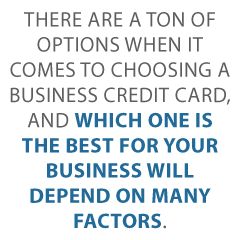
Business Credit Card Rates: Everything You Might Need to Pay
Find Out What Hidden Business Credit Card Rates to Look For and How to Avoid Them
Credit cards are a fact of life for most small businesses. They get a bad rap, but used properly they can be hugely beneficial. It is a precarious walk on a balance beam, however, to balance the benefits versus the cost. When you think of business credit card rates, the first thing that comes to mind is probably interest rates. These are, of course, one of the largest costs of credit cards. They are also widely variable, ranging from as low as 0% for an introductory rate to almost 30% in some cases.
There are many more costs that can be associated with these cards however. So many in fact, that many business owners do not even realize the business credit card rates they are paying. It can be frustrating to continually make payments yet never see a corresponding decrease in the balance. We dug in to find out everything you need to know about the business credit card rates you know, those you don’t know, and how to handle or avoid each one.
Business Credit Card Rates: The Devil You Know
Here are some common business credit card rates you are probably familiar with, and some tips on how to save on each.
Check out our professional research and score the best business credit cards for your business.
Interest
This is a given with any credit card, and most likely the number one cost most associate with them. The only way to avoid it is to pay off the entire balance every month. Short of that, it cannot be eliminated. It can be reduced however.
First, keep your personal and business credit score strong. The better the score, the lower the interest rate options available to you. Then, shop around. Just look for the cards with the best rates. Be aware however, many lower rates are promotional only, so they will go up after a set period of time.
Annual Fees
When it comes to business credit card rates, this one is no secret either. Many cards charge an annual fee for the administration of the account. Most often they are associated with cards that earn rewards such as miles or points that can be converted to gift cards, airline miles, or cash back. The key to keeping annual fee costs to a minimum is to simply use cards that do not charge this fee.
If, however, you find a card with a fee that has rewards that you will use to the point that you recover the cost of the fee plus some, then the benefit may outweigh that cost. There could be other benefits associated with a card that charges a fee as well. A cost-benefit analysis based on your specific business situation is the only way to know if it is worth it.
Late Fees
This one is self-explanatory. Late fees are charged to your card when you pay after the due date. The best way to avoid them is to not pay late. However, know that if you do pay late and it is a first offense, you may be able to have that fee removed. You have to call and ask. It doesn’t always work, but sometimes it does for a first offender.
Hidden Business Credit Card Rates
Now for the part you are really wondering about. What are you paying that you do not realize? How much could you save if you knew about these things and either avoided them or chose cards that did not charge them? Here are the hidden costs to look for, and how to reduce or avoid them all together.
Balance Transfer Fees
These are fees on balances that you transfer from another card. Typically this would be done in an effort to get a lower, promotional interest rate on the balance transfer. Usually the fee is a percentage of the amount being transferred with some minimum. So if, for example, you were to transfer $3,000 and the transfer fee was 3%, your balance on the new card would increase by $3,090.
The only way to avoid this is to not do a balance transfer. Of course, there could be cases where the savings with the promotional rate makes it worth the fee. That will have to be determined on an individual basis.
Cash Advance Fees
These are just as they sound, fees paid on cash advance funds. Similar to balance transfer fees, they are typically a percentage of the advance. Cash advances can come in the form of cash advance checks that you simply write and deposit into your account, or funds that you get from an ATM with your credit card and a cash advance PIN. If you do not do cash advances with your credit card, you do not have to worry about this fee.
Reward Redemption Fees
Did you know that sometimes you have to pay a fee on rewards that you earn? The credit card companies say that this is to pay for the processing of the rewards. Avoid these fees by reading the fine print in the rewards section before you apply for the card. Most do not even know that these fees exist, and sometimes they end up costing more than the rewards are even worth.
Reward Recovery Fees
This fee is closely related to late fees. Some cards revoke rewards earned during the month if you are late on your payment for that month. They then charge a fee to reinstate those rewards. To avoid this fee, be sure to pay on time.
Inactivity fees and Account Closure Fees
The inactivity fee is assessed after you go a certain length of time without any activity on the card. Most often that amount of time is one year. The first thing you have to do to avoid this fee is know which cards have if. After you determine that, figure out the minimum you must spend in a year to avoid the fee. Then, either make certain you spend that amount, or cancel the card.
Beware however, because some cards do charge a fee for closing accounts.
Payment Protection
Most cards offer a payment protection plan. This is basically insurance that will cover your payments in the event you become ill or unemployed. While is sounds great, it can be quite expensive and add up quickly. Avoid it by either opting out on the front end, or canceling it if you already have it and do not want to pay it.
Paper Statement
The push to save the environment is a noble one, and the credit card companies are doing their part. One way they are doing this is by charging a fee for paper statements. You can opt in for electronic statements and avoid paying the fee.
Foreign Transactions
Did you know that if you use your credit card to pay for goods from a company that is not located in the United States, you may have to pay a fee for that transaction? This is true even if you never leave the country, and even if you do not know the other company is foreign. Read the fine print about fees before making any purchases from companies you are not familiar with to determine if this will be an issue.
Taxes on Rewards
While this isn’t exactly a credit card fee, it is a potential hidden cost of using credit cards. There are times when, depending on how rewards are earned and how they are used, that you may have to pay taxes on them. Find out more about this and how to avoid it here.
Check out our professional research and score the best business credit cards for your business.
Here’s the big key to avoiding unexpected fees and costs. Know what to look for. Now that you have a list of the most common hidden credit card costs, you can be diligent to pay close attention on the front end and not apply for any credit cards that charge fees you do not want to pay.
No one wants to pay more than they have to. On the other hand, some of these fees may be worth it to you to pay depending on the benefit associated with it and whether or not your specific business could benefit. For example, if you have a chronic health issue, it may be worth it to you to pay for the payment protection plan.
Why Business Credit Card Rates May Be Worth It: Benefits of Business Credit Cards
While all these costs can make it seem that credit cards are the devil, and though they do get a bad rap, there are actually plenty of benefits to using business credit cards. Here are just a few:
- Build business credit
- Finance business needs without the hassle of a loan, including:
- Taking advantage of special bulk pricing
- Equipment maintenance and repair
- Working capital
- Unexpected, or expected, cash gaps
- Use rewards to reduce costs
Of course, we all know credit can get out of hand, but used properly and with the proper attention to business credit card rates, they can be an amazing tool for your business.
How Can They Help Build Business Credit?
Not only can these cards help you build business credit, they are actually vital to the process. Of course, regardless of the business credit card rates, you will have to have business credit to get business credit. That is why you start with vendors in the vendor credit tier first. These vendors will give you net 30 terms on invoices and report those payments to the credit reporting agencies, without a credit check. After you have enough of these accounts reporting, you will have enough business credit to apply for your first business credit cards.
You’ll start with store cards. Cards tied to retail stores such as Best Buy, Office Depot, and Lowes will approve accounts with very new business credit earned from accounts in the vendor credit tier. They will also report payments to the credit agencies, which will further grow your score
After enough of these are reporting, you can apply for cards in the fleet credit tier and the cash credit tier. As these cards report your on-time payments, your score will only grow stronger. This will also mean you start getting offers from cards with more favorable business credit card rates, such as lower interest. Find out more about the credit tiers and building business credit using credit cards in each one here.
Side Note: Hidden Business Credit Card Rates When Accepting Credit Cards
Just as there are hidden fees when it comes to using credit cards in the course of your business, there are also hidden rates on the other side. If you accept cards as payment in the course of your business, be aware of these little-known costs.
Manual entry fee
Did you know that it costs your business more in credit card processing fees if you manually enter the credit card number rather than swiping it? It’s because of the increased security risk. If at all possible, make sure customers swipe instead of type in the number.
Check out our professional research and score the best business credit cards for your business.
Below Limit Costs
Okay so this isn’t an “extra” fee per se, but it is a definite cost. It is entirely possible that you can lose money on a credit card sale if it doesn’t hit a certain dollar amount. This is because the business credit card rate on processing that transaction may actually be more than the profit earned from it.
That’s why you see many businesses, such as donut shops and other businesses with frequent low dollar amount purchases, require a minimum purchase if you intend to use a card. This not only avoids the problem of losing money on low dollar amount purchases due to processing fees, but it can increase profits when you consider the number of people that do not carry cash.
Stop Paying Business Credit Card Rates You Do Not Know About
It is impossible to find a card with no unsavory fees. The key is to determine which ones are worth it to you to pay. Then, apply only for cards that charge business credit card rates you are willing to pay. The credit card industry is fiercely competitive, and if your business credit score is solid, you can have your pick of the cards that will work best for you.
The post Business Credit Card Rates: Everything You Might Need to Pay appeared first on Credit Suite.
The post Business Credit Card Rates: Everything You Might Need to Pay appeared first on BUSINESS DEMO WEBSITES.
The post Business Credit Card Rates: Everything You Might Need to Pay appeared first on Buy It At A Bargain – Deals And Reviews.









